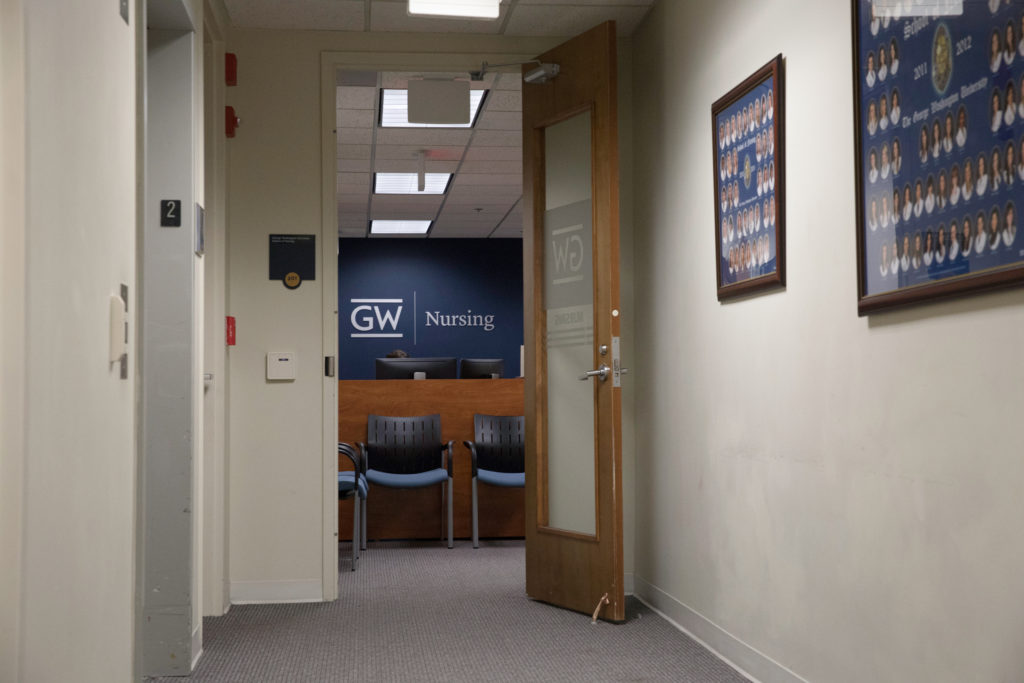Updated: March 1, 2022 at 12:58 p.m.
Researchers in the School of Nursing are distributing take-home self-sampling kits to detect HPV in HIV-positive women in D.C. as part of an ongoing study.
Daisy Le, an assistant professor of health disparities and oncology, leads the MySHARE study that distributed 40 HPV self-testing kits to women who are at high risk of contracting HPV as an alternative screening method at the start of the spring semester. She said the lab detected HPV in 25 of the 40 tests, allowing doctors to speed up treatment and prevent the development of cervical cancer in earlier stages.
Le said the team plans to continue collecting participants’ samples into the summer to attain a larger sample size, and researchers are targeting to recruit a total of 50 women to participate. She said increasing the number of participants can help the team make a better case in its requests for funding from the National Institute of Health.
She said she hopes the study can partner with local health departments to distribute self-testing HPV kits to “medically-underserved” women across the country in the next five to 10 years.
“There’s so much out there in terms of goals that we want to eliminate cervical cancer because we have HPV vaccines, we have HPV screening itself as not just a sub-test for HPV testing, we have a pap smear, we can use all of that to catch cervical cancer before it becomes cancer and help a woman live longer,” she said.
Le said the team designed their testing packages to include a packet of detailed instructions and a copy of their pre-signed participation consent form, health education materials about HPV and a pap smear – a testing kit of one brush for the vaginal area and one anal swab, a clear envelope for the collections and a box for the participants to send their results to the lab to detect HPV.
She said the participants should collect both samples from the vaginal and anal regions, submit their specimen collections through mail and the lab observes if the same strain of HPV is consistent across the two areas to determine if a participant has HPV.
Le said the participants can also choose to enroll in a text messaging program to receive information about HPV and cervical cancer prevention for a few weeks, which is offered in the testing kits.
Le said the study targets D.C. because it houses a high HIV-positive population – more than 12,400 residents lived with HIV in 2019, according to D.C. Health. The District’s rate of new HIV diagnoses per 100,000 people ranked the highest in the United States, with a total of 39.1 in 2018, according to Centers for Diseases Control and Prevention data.
HIV-positive women are six times more likely to develop cervical cancer compared to women living without HIV because they have an increased risk of contracting HPV, which elicits rapid progression of cancer and higher rates of return post-treatment, according to a 2020 World Health Organization release.
“That’s why we have the field of public health,” she said. “It’s to try to catch things early enough because cervical cancer is highly preventable.”
Le said the research team conducted in-depth interviews with D.C. health care providers and held focus group discussions with 39 HIV-positive women in the study’s first phase two years ago.
She said the team gathered information about the women’s backgrounds, knowledge of cervical cancer and HPV and if they had completed a pap smear within the recommended amount of time, which is once every year. She said the women’s answers improved the tools within the self-testing HPV kits like providing easy to follow instructions for HIV-positive women with little knowledge about HPV and cervical cancer.
“We were working with the community, talking with them about what are their main concerns, what haven’t they seen in terms of health promotion and intervention and what were they not seeing in the community that they wanted us to focus on,” she said.
Reproductive health and HPV experts said MySHARE’s self-testing kits and text messages are effective measures to increase HIV-positive women’s accessibility to HPV screening and cervical cancer awareness.
Chemtai Mungo, a professor of obstetrics and gynecology at the University of North Carolina at Chapel Hill, said MySHARE can help increase accessibility to screening tests at home because participants can mail their HPV self-sampling tests to their health clinics, reducing the need to travel.
She said the study provides an alternative screening option that benefits patients who have transportation issues and would rather wait until they receive a positive HPV test to seek medical care.
“Using technology to raise information that helps to fight myths helps with health education – it’s an excellent way to get knowledge to where women are quickly in ways where they don’t have to come to the clinic or they don’t have to go find them,” she said.
Gina Ogilvie – the Canadian research chair in the Global Control of HPV Related Diseases and Cancers, an organization of HPV prevention experts – said the MySHARE study’s focus on the population of HIV-positive women is significant as they can contract any one of the 200 kinds of HPV that exist.
“Particularly in the U.S. with health coverage, this is something that can be done,” she said. “You just need to offer someone a kit and they can go about it by themselves, so you can really focus on the resources for women who are HPV positive.”
Richard Schlegel, a professor of pathology at Georgetown University, said the self-sampling kits simplify the HPV screening process, eliminating steps like health clinic appointments and expanding healthcare accessibility for HIV-positive women.
He said the project would be a “step forward” for cervical cancer prevention, especially in parts of the United States that do not have adequate health care facilities, like communities in towns alongside the Appalachian trail, to screen all HIV-positive women for HPV.
“Down the line, I think that would be great not only in our country but also in developing countries where it’s hard to get people to commit to the clinics on a regular basis,” he said.
This post has been updated to correct the following:
The Hatchet incorrectly reported that the research lab detected HPV in 40 percent of the 25 tests that participants returned. The lab detected HPV in 25 of the 40 tests. The Hatchet also reported that 50 women need to apply for the study to receive a larger amount of funding from the National Institute of Health. The team is targeting to recruit 50 women to participate, but that would not directly affect NIH funding. We regret these errors.








